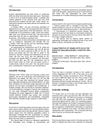 49 citations,
August 2007 in “Dermatologic surgery”
49 citations,
August 2007 in “Dermatologic surgery” New treatments for acne scars are safer and more effective because we understand the causes better.
 1 citations,
March 2023 in “Frontiers in Cardiovascular Medicine”
1 citations,
March 2023 in “Frontiers in Cardiovascular Medicine” A specific gene variant is linked to heart disease, increased heart muscle, curly hair, and thick skin on palms and soles.
 19 citations,
September 2020 in “Pharmaceutics”
19 citations,
September 2020 in “Pharmaceutics” Sodium Valproate nanospanlastics could be a safe and effective treatment for Androgenic Alopecia, with fewer side effects than minoxidil.
 4 citations,
April 2021 in “Experimental and Molecular Medicine”
4 citations,
April 2021 in “Experimental and Molecular Medicine” The conclusion is that certain genetic factors and blood types may affect COVID-19 severity, but changes in ACE2 and TMPRSS2 genes are not clearly linked to it.
 November 2023 in “ACS Omega”
November 2023 in “ACS Omega” New liposome treatment successfully delivers CRISPR to deactivate a key enzyme in androgen-related disorders.
 38 citations,
January 2016 in “Cell Death and Disease”
38 citations,
January 2016 in “Cell Death and Disease” The TCL1 transgenic mouse model is useful for understanding human B-cell leukemia and testing new treatments.
 14 citations,
January 2021 in “Cureus”
14 citations,
January 2021 in “Cureus” The AndroCoV Clinical Scoring is a quick, accurate, and free tool for diagnosing COVID-19.
16 citations,
November 2008 in “Journal of the American Academy of Dermatology” Consider necrolytic acral erythema in similar cases and treat with oral zinc sulfate.
 1 citations,
April 2023 in “Frontiers in Immunology”
1 citations,
April 2023 in “Frontiers in Immunology” New treatments for hair loss from alopecia areata may include targeting immune cells, using stem cells, balancing gut bacteria, applying fatty acids, and using JAK inhibitors.
 5 citations,
August 2020 in “Stem Cell Research & Therapy”
5 citations,
August 2020 in “Stem Cell Research & Therapy” Using fat-derived stem cells with the drug meglumine antimoniate can help control skin disease and reduce parasites in mice with leishmaniasis.
35 citations,
August 2006 in “Molecular genetics and metabolism” Tissue-specific variation in mutant load complicates genetic counseling and prenatal diagnosis.
 April 2018 in “Journal of Investigative Dermatology”
April 2018 in “Journal of Investigative Dermatology” The document concludes that ERBB2 mutations are common in extramammary Paget disease and may respond to systemic treatments like cancer immunotherapy.
 45 citations,
October 1988 in “British Journal of Clinical Pharmacology”
45 citations,
October 1988 in “British Journal of Clinical Pharmacology” Using topical minoxidil for baldness can cause heart problems, especially in those with heart disease.

research Acne
2 citations,
May 2011 in “Harper's Textbook of Pediatric Dermatology” Acne is a common skin condition linked to diet, hormones, and genetics, and early treatment can prevent scarring.

Diet and supplements can significantly affect acne, with some foods and nutrients reducing and others worsening it.
 7 citations,
August 2022 in “Journal of Nanobiotechnology”
7 citations,
August 2022 in “Journal of Nanobiotechnology” Advancements in nanoformulations for CRISPR-Cas9 genome editing can respond to specific triggers for controlled gene editing, showing promise in treating incurable diseases, but challenges like precision and system design complexity still need to be addressed.
 2 citations,
September 2009 in “Nurse Prescribing”
2 citations,
September 2009 in “Nurse Prescribing” PCOS affects many women, causing various symptoms and health risks, and is managed through lifestyle changes, medication, and support groups.

Understanding genetics is crucial for treating heart and skin diseases.
 2 citations,
January 2023 in “Pharmaceuticals”
2 citations,
January 2023 in “Pharmaceuticals” Natural products and phytochemicals may help with hair regrowth, but more research is needed.
 42 citations,
June 2020 in “Seminars in Oncology”
42 citations,
June 2020 in “Seminars in Oncology” Sex hormones may affect COVID-19 severity, with men often faring worse, and targeting related pathways could offer treatment options.
24 citations,
September 2011 in “Autoimmunity” Natural killer cells play a key role in autoimmune skin diseases like pemphigus vulgaris.
 August 2023 in “Journal of The American Academy of Dermatology”
August 2023 in “Journal of The American Academy of Dermatology” Early treatment is key for permanent hair loss disorders, with options ranging from medications and phototherapy to immunomodulators and antibiotics, depending on severity and type.
 December 2015 in “Vascular Pharmacology”
December 2015 in “Vascular Pharmacology” Prasugrel is better than clopidogrel at preventing heart damage and improving blood flow in small heart vessels during heart artery procedures.
 April 2019 in “Journal of the Dermatology Nurses’ Association”
April 2019 in “Journal of the Dermatology Nurses’ Association” A 37-year-old man with hair loss and skin issues was successfully treated with oral antibiotics, highlighting the need for early treatment. Long-term care includes low-dose antibiotics and avoiding caps and wigs.
 14 citations,
May 2008 in “Journal of proteome research”
14 citations,
May 2008 in “Journal of proteome research” Dutasteride may help reduce brain plaque linked to Alzheimer's by affecting cell energy structures and waste removal.
 12 citations,
June 2005 in “Journal of the European Academy of Dermatology and Venereology”
12 citations,
June 2005 in “Journal of the European Academy of Dermatology and Venereology” A man with HIV developed skin and hair issues after starting HIV treatment, which improved with topical treatment.
 2 citations,
April 2018 in “Journal of Investigative Dermatology”
2 citations,
April 2018 in “Journal of Investigative Dermatology” Intralesional chemotherapy with 5-fluorouracil and methotrexate may worsen keratoacanthoma-type skin cancer in transplant patients.
 September 2020 in “Annals of the National Academy of Medical Sciences. India”
September 2020 in “Annals of the National Academy of Medical Sciences. India” COVID-19 can cause skin issues like "COVID toes," rashes, hair loss, and hand eczema, and dermatologists are important for recognizing these signs.
 November 2011 in “Journal of Infection”
November 2011 in “Journal of Infection” Many women with HIV in the North of England are diagnosed late and have other health conditions.
 48 citations,
January 2017 in “Skin Pharmacology and Physiology”
48 citations,
January 2017 in “Skin Pharmacology and Physiology” Finasteride-loaded nanoparticles may help treat alopecia.



























